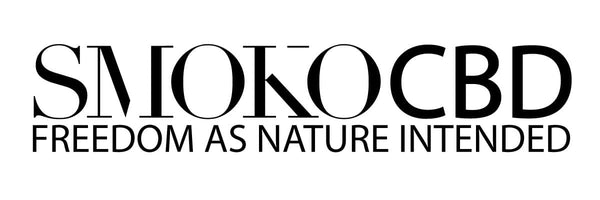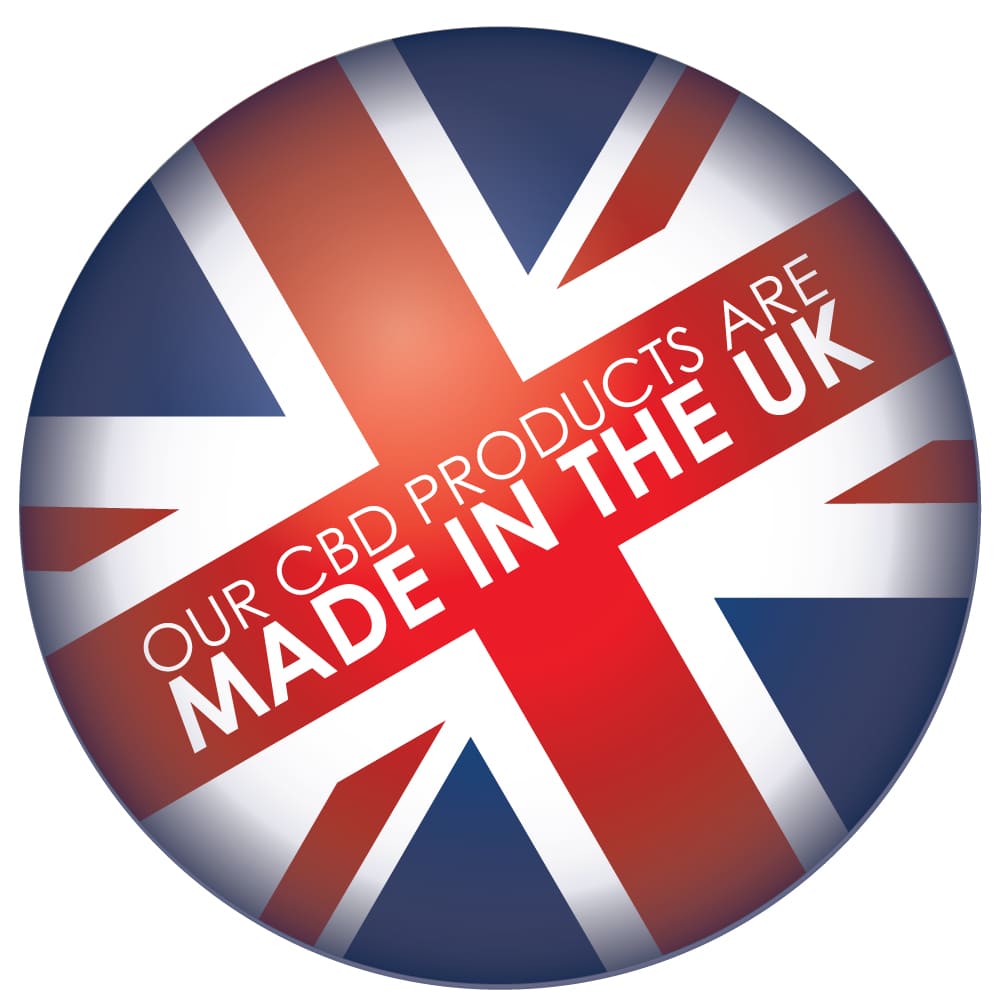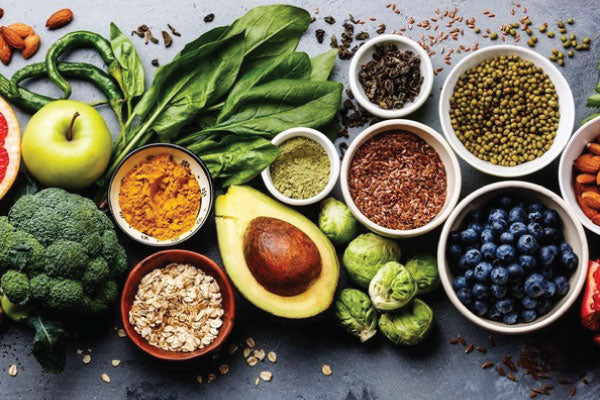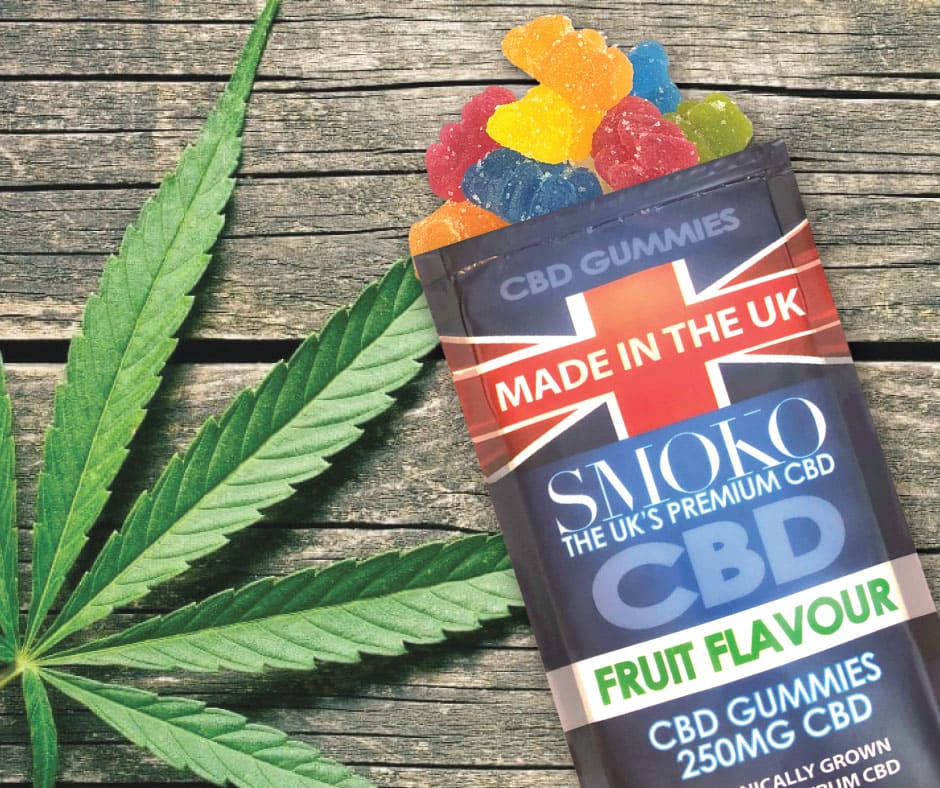Unlocking the Mysteries of CBD and THC
Curious about CBD and THC? This listicle clarifies the seven key differences between these cannabinoids—compounds interacting with your body's endocannabinoid system, which regulates functions like sleep and pain. We'll explore why THC is a controlled substance in the UK, while CBD, especially broad-spectrum CBD (like that found in SMOKO CBD products), is gaining popularity. Discover the various types of CBD, including isolate and full-spectrum, and understand why third-party lab testing is crucial, as highlighted by studies in JAMA Network Open and ScienceDirect. Learn how to start your CBD journey safely and effectively. This guide is especially helpful for those seeking natural relief from pain, anxiety, or chronic conditions, but if you are on medication or pregnant, consult your doctor before using CBD.
1. Chemical Structure and Composition
Understanding the chemical makeup of CBD (cannabidiol) and THC (tetrahydrocannabinol) is crucial to grasping their distinct effects. Both are cannabinoids, naturally occurring compounds found in the cannabis plant. However, subtle differences in their chemical structures lead to vastly different interactions with our bodies. While they both share the same atomic makeup – 21 carbon atoms, 30 hydrogen atoms, and 2 oxygen atoms – the arrangement of these atoms is key. THC contains a cyclic ring structure that CBD lacks, a seemingly small difference that accounts for THC's psychoactive properties, which are absent in CBD. Both originate from the same precursor molecule, CBGA (cannabigerolic acid), but follow different biosynthetic pathways. Furthermore, both compounds are fat-soluble, meaning they are absorbed and stored in fat tissues within the body.
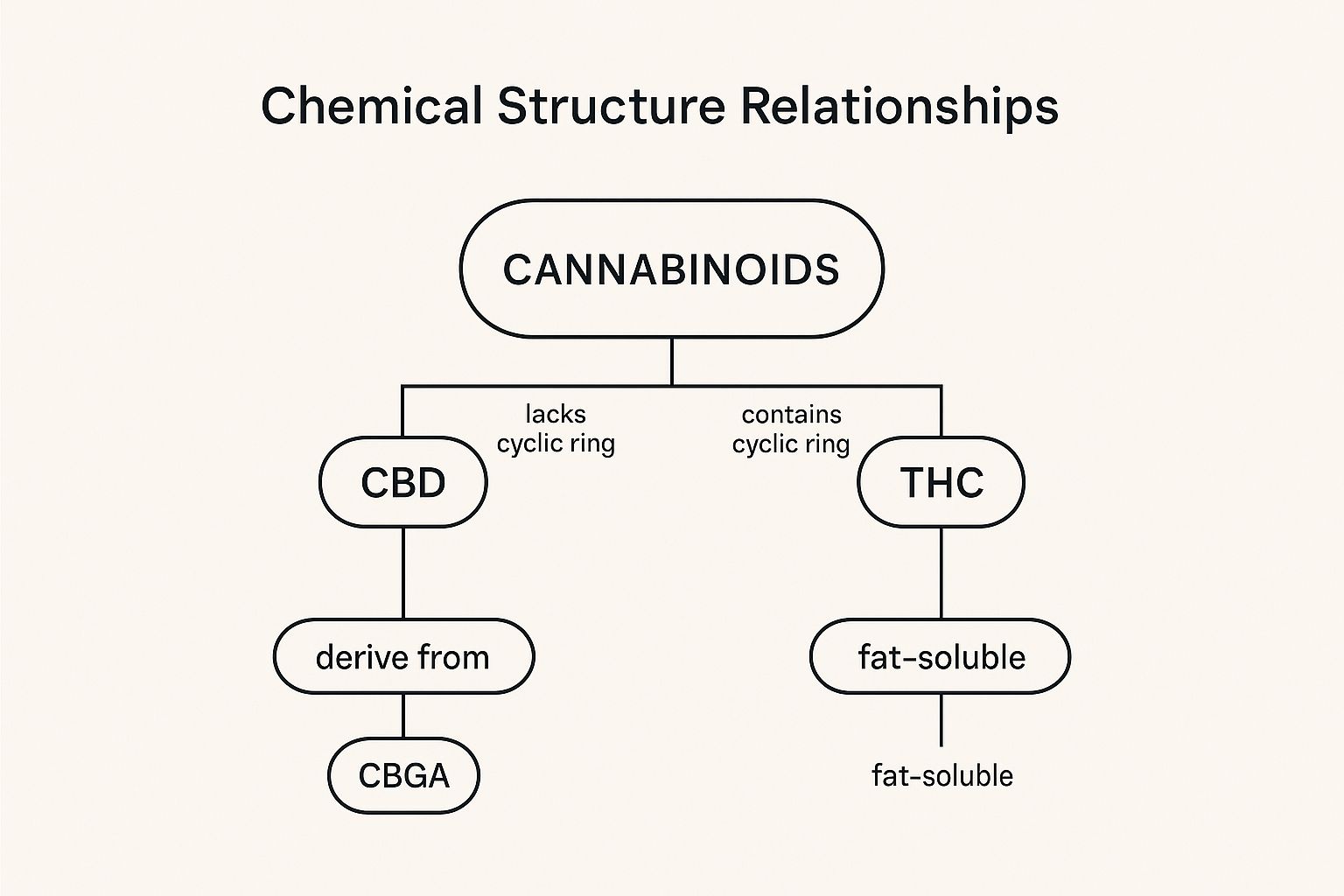
This infographic visually represents the key structural differences between CBD and THC, highlighting the presence of the cyclic ring in THC and its absence in CBD, as well as their shared origin from CBGA. It emphasises how this subtle variation impacts their interaction with the endocannabinoid system and ultimately, their effects.
This fundamental difference is why THC is a controlled substance in the UK, while CBD is not. THC's cyclic ring allows it to bind strongly to CB1 receptors in the brain, leading to the psychoactive "high" associated with cannabis use. CBD, on the other hand, has a weaker affinity for CB1 receptors and even acts as a modulator of THC, potentially reducing its psychoactive effects. Both CBD and THC interact with the body's endocannabinoid system (ECS), a complex network of receptors and neurotransmitters that helps regulate various physiological functions such as sleep, mood, appetite, and pain. The ECS plays a vital role in maintaining homeostasis, or balance, within the body.
It's also important to differentiate between "hemp" and "cannabis" plants. While both belong to the Cannabis sativa species, "hemp" is legally defined as containing less than 0.2% THC (in the UK) and is primarily used for industrial purposes. "Cannabis" refers to plants with higher THC content, typically cultivated for recreational or medicinal use.
Learn more about Chemical Structure and Composition
Understanding the chemical nuances of CBD and THC is essential for developing targeted medical applications and explaining why CBD doesn't cause the same psychoactive effects as THC. This knowledge also helps consumers make informed decisions about which type of CBD product is right for them. There are three main types of CBD products: isolate, broad-spectrum, and full-spectrum. CBD isolate contains only pure CBD, while broad-spectrum CBD includes other cannabinoids and terpenes but no THC. Full-spectrum CBD contains all the compounds found in the cannabis plant, including trace amounts of THC (within legal limits). While full-spectrum products are favoured by some for the "entourage effect," where various cannabinoids work synergistically, individuals sensitive to THC or subject to drug testing should avoid full-spectrum products and opt for broad-spectrum or isolate options.
It is critically important to choose CBD products backed by independent third-party lab test certificates. Studies published in reputable journals such as JAMA Network Open (https://jamanetwork.com/journals/jamanetworkopen/fullarticle/2794440?utm_source=For_The_Media&utm_medium=referral&utm_campaign=ftm_links&utm_term=072022) and ScienceDirect (https://www.sciencedirect.com/science/article/abs/pii/S0376871622002599) highlight the concerning inaccuracy of labelling and THC content in many CBD products. These certificates provide assurance that the product contains the stated amount of CBD and is free from harmful contaminants.
SMOKO offers a range of high-quality broad-spectrum CBD products. If you are new to CBD, start with a low dose (e.g., 5-10mg) and gradually increase as needed. Consult your doctor before using CBD, especially if you are taking other medications, pregnant, or breastfeeding. This information is particularly pertinent for those in the UK seeking natural relief from pain, anxiety, or other health concerns, including athletes, fitness enthusiasts, individuals with chronic conditions, and those curious about exploring the potential benefits of CBD.
2. Psychoactive Effects
When comparing CBD vs THC, the most fundamental difference lies in their psychoactive effects. This is a crucial distinction for anyone considering using either compound. THC (tetrahydrocannabinol) is the primary psychoactive component in cannabis, responsible for the "high" sensation. CBD (cannabidiol), on the other hand, is non-intoxicating. This difference stems from how each cannabinoid interacts with the endocannabinoid system (ECS), a complex network of receptors and neurotransmitters found throughout the body. The ECS plays a vital role in regulating various bodily functions, including mood, sleep, appetite, pain, and immune response.
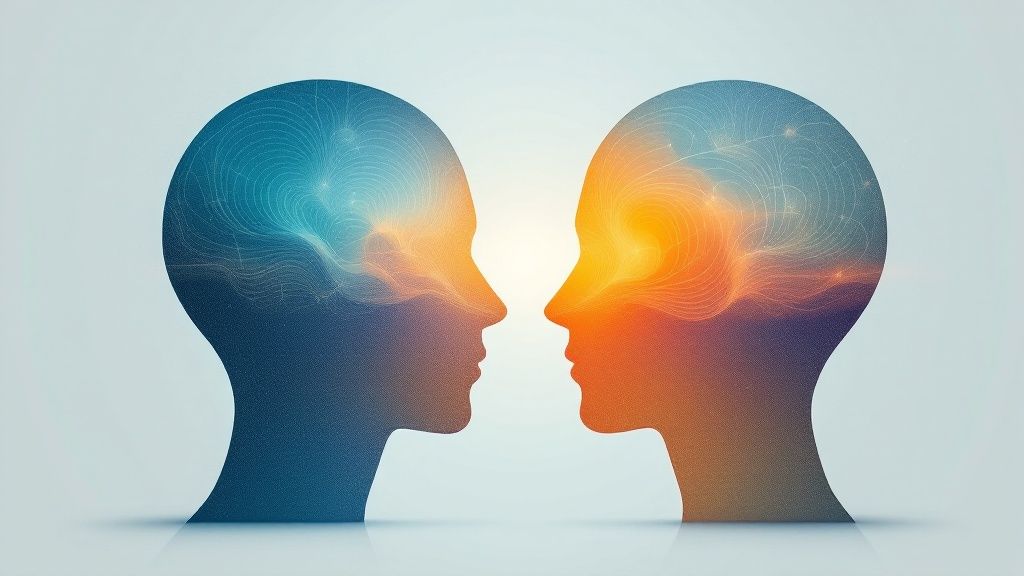
THC binds directly with CB1 receptors, which are concentrated in the brain, creating the psychoactive effects. CBD, however, does not bind well with CB1 receptors and therefore doesn't cause intoxication. THC is well-known for its psychoactive effects. To understand the science behind this effect, you can learn more about Delta 9 THC. THC can induce euphoria, altered sensory perception, and changes in thinking. Interestingly, CBD may actually moderate the psychoactive effects of THC when the two are used together. This makes understanding the differences between "hemp" and "cannabis" plants important. While both belong to the Cannabis sativa species, "hemp" is legally defined as containing less than 0.2% THC (in the UK) and "cannabis" refers to plants with higher THC concentrations. This distinction explains why THC, unlike CBD, is a controlled substance in many places.
Features:
-
THC: Binds directly with CB1 receptors, producing psychoactive effects; can cause euphoria, altered sensory perception, and changes in thinking.
-
CBD: Does not bind well with CB1 receptors and does not cause intoxication; may moderate the psychoactive effects of THC.
Pros:
-
THC: Psychoactive effects can be therapeutic for some conditions like PTSD.
-
CBD: Offers therapeutic benefits without impairment; does not impact cognitive function or motor skills.
Cons:
-
THC: Can cause anxiety, paranoia, or psychosis in some users; impairs driving ability and cognitive function; psychoactive effects limit its legal status and acceptance.
-
CBD: While generally well-tolerated, some individuals may experience mild side effects like drowsiness or changes in appetite.
SMOKO offers a range of broad-spectrum CBD products, meaning they contain multiple cannabinoids and other beneficial plant compounds but are THC-free. This ensures you can experience the potential benefits of CBD without any psychoactive effects or concerns about THC's legal status. SMOKO utilises independent third-party lab testing to ensure product purity and accurate cannabinoid content, providing transparency and building consumer trust - you can view the testing certificates here. This is important considering studies have highlighted inconsistencies in labelling accuracy within the CBD market.
CBD Dosing:
When starting with SMOKO CBD, it's recommended to begin with a low dose and gradually increase it as needed until you find the optimal amount for your individual needs. Consult the specific product instructions for suggested starting doses.
Important Note: If you are pregnant, breastfeeding, or taking prescribed medications, consult your doctor before using any CBD product. While CBD is generally considered safe, it can interact with certain medications.
This information is intended for educational purposes and does not constitute medical advice. Always consult with a qualified healthcare professional before starting any new supplement regimen.
3. Medical Applications and Therapeutic Uses
Understanding the therapeutic potential of both CBD and THC is crucial when comparing these two prominent cannabinoids. While both offer analgesic, anti-inflammatory, and neuroprotective properties, their distinct mechanisms of action make them suitable for treating different conditions. This section explores their unique benefits and why this aspect of CBD vs THC is so important for those seeking natural wellness solutions. Learn more about Medical Applications and Therapeutic Uses
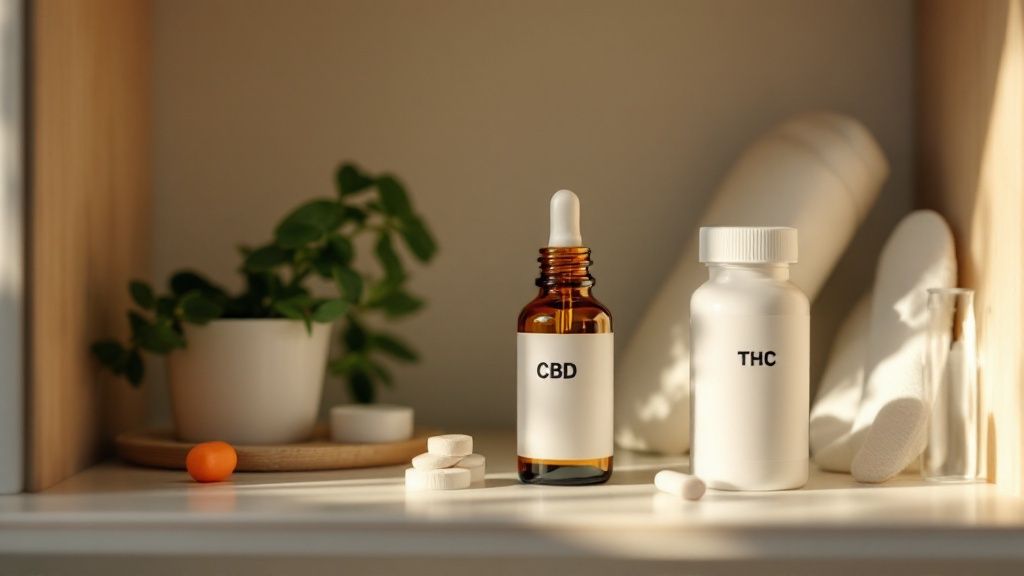
THC's primary mechanism of action involves binding directly to CB1 receptors in the brain, leading to psychoactive effects. This interaction makes THC particularly effective for managing pain, nausea, stimulating appetite, and reducing muscle spasticity. However, this psychoactive effect is also why THC is a controlled substance in the UK. In contrast, CBD has a more indirect interaction with the ECS, modulating the activity of CB1 receptors and other receptors involved in pain and inflammation - namely the CB2 receptors that are found mainly in the spleen, immune cells and cardiovascular tissues (x). This difference explains why CBD demonstrates promising results for conditions like anxiety, epilepsy, and inflammation, and is being explored as a potential treatment for addiction.
Combining CBD and THC may offer enhanced therapeutic benefits through the "entourage effect," where the different components of the cannabis plant work synergistically to produce a more pronounced effect than either compound alone. While research into the entourage effect is ongoing, it suggests that whole-plant extracts may offer a broader range of therapeutic benefits.
SMOKO CBD Products (Broad-Spectrum):
SMOKO offers a variety of broad-spectrum CBD products. Broad-spectrum means they contain a range of cannabinoids and terpenes found in hemp, but without any THC. This is important for those who wish to avoid THC entirely. Some examples of SMOKO CBD products include:
-
CBD Oils: Available in various strengths and flavours.
-
CBD Capsules: For convenient and precise dosing.
-
CBD Gummies: A tasty way to get your CBD and may increase the bioavailability.
Suggested Dosing Regimen for SMOKO CBD:
Starting with a low dose of SMOKO CBD and gradually increasing it is advisable. Consult SMOKO's product information for specific dosage guidelines. Keeping a symptom journal is helpful for tracking effectiveness and finding your optimal dose.
Pros and Cons of Cannabinoid Therapies:
Pros:
-
THC has FDA-approved applications (dronabinol for AIDS wasting and chemotherapy-induced nausea).
-
CBD has FDA approval for certain forms of epilepsy (Epidiolex).
-
Both may reduce reliance on more addictive or harmful medications.
-
CBD has fewer side effects than many conventional medications.
Cons:
-
Research is still limited due to previous legal restrictions.
-
Variable quality and consistency in non-pharmaceutical products. Third-party lab testing, like that conducted on SMOKO products, is vital for ensuring the quality and safety of CBD products.
-
Medical insurance rarely covers cannabis products in the UK.
-
Doctor knowledge about cannabinoid therapies remains limited, though this is improving.
Tips for Using CBD:
-
Consult your healthcare provider before using CBD, especially if you are on prescribed medications or pregnant.
-
Start with CBD-dominant products before trying THC-containing options.
-
Be aware that effects may vary significantly between individuals.
This discussion of medical applications and therapeutic uses earns its place in this "CBD vs THC" listicle by highlighting the unique benefits and considerations associated with each cannabinoid. The importance of understanding these differences is crucial for making informed decisions about your wellness journey. This is particularly important for those seeking natural relief from anxiety, pain, inflammation, and other conditions. Remember to always prioritise products from reputable brands like SMOKO, which prioritise quality, transparency, and third-party testing.
4. Legal Status and Regulations: Navigating the CBD and THC Landscape
Understanding the legal status of CBD and THC is crucial, especially in the UK. This complex landscape varies significantly worldwide and is constantly evolving. This distinction is paramount, particularly concerning the difference between hemp and cannabis, and their respective cannabinoid content.
Cannabinoids and the Endocannabinoid System (ECS)
Cannabinoids are naturally occurring compounds found in cannabis plants. Both CBD (cannabidiol) and THC (tetrahydrocannabinol) are cannabinoids, but they interact with the body differently. These interactions primarily occur within the endocannabinoid system (ECS), a complex cell-signalling system found in all mammals. The ECS plays a vital role in regulating a wide range of bodily functions, including mood, sleep, appetite, pain, and immune response.
THC, the ECS, and its Controlled Status
THC is the primary psychoactive compound in cannabis, meaning it produces the "high" associated with marijuana use. It interacts with the ECS by binding directly to CB1 receptors, primarily located in the brain and central nervous system. This interaction disrupts normal neurological function, leading to altered perception, mood changes, and impaired coordination. Due to these psychoactive effects, THC is classified as a controlled substance in many countries, including the UK, where it remains illegal except for specific medical uses.
CBD, the ECS, and its Legal Status
CBD, unlike THC, is non-intoxicating and does not produce a "high." Its interaction with the ECS is more complex and less direct. While it doesn't bind strongly to CB1 receptors, it influences the ECS in other ways, such as by inhibiting the breakdown of anandamide, a naturally occurring endocannabinoid. This interaction is thought to contribute to CBD's potential therapeutic benefits, such as anxiety and pain relief.
Hemp vs. Cannabis
The terms "hemp" and "cannabis" often cause confusion. Both refer to the Cannabis sativa plant species, but the legal distinction lies in their THC content. Hemp is defined as cannabis containing less than 0.3% THC (0.2% in the UK). This low THC content means hemp is non-intoxicating. CBD products derived from hemp are legal in the UK, provided they meet this THC limit.
5. Side Effects and Safety Profiles
When comparing CBD vs THC, understanding their safety profiles is paramount. This knowledge empowers both medical and recreational users in the UK to make informed choices. While both compounds originate from the cannabis plant and interact with our endocannabinoid system (ECS), they possess distinct characteristics and effects.
Side effects
Typical side effects associated with THC (typically experience by smoking cannabis) include:
-
headaches
-
dry mouth and/or eyes
-
lightheadedness and dizziness
-
drowsiness
-
Fatigue
-
Nausea an vomiting
-
Disorientation
-
Hallucinations
-
Increased heart rate
-
Increased appetite
CBD is generally well-tolerated, but typical side effects associated with CBD include (x):
-
Dry mouth
-
Diarrhoea
-
Reduced appetite
-
Drowsiness
-
Fatigue
Drug Interactions
Another consideration are the drug interactions - how taking CBD or THC impacts how other drugs are processed in the body.
Some significant drug interactions for THC include sedatives like diazepam, potentially increasing the drowsiness effect as well as slowing or preventing the breakdown in the body. Anti-anxiety medications, like Alprazolam, and anti-depressants may also cause excessive drowsiness or other effects when taken in addition to THC, as well as preventing their breakdown in the body.
CBD can impact how drugs are processed in the body, too. From increasing or decreasing the effectiveness and impacting the speed of breakdown in the body, or increasing the risk of side effects. This can include (but is not limited to) heart rhythm medications, benzodiazepenes, opioids and sedatives.
6. Consumption Methods and Bioavailability
When comparing CBD vs THC, understanding consumption methods and bioavailability is crucial for optimising your experience. Bioavailability refers to the amount of CBD or THC that enters your bloodstream and interacts with your endocannabinoid system (ECS).
Different consumption methods offer varying bioavailability, onset times, and durations of effects. This impacts how quickly and effectively CBD and THC work. Choosing the right method allows for a personalised approach based on individual needs and desired outcomes.
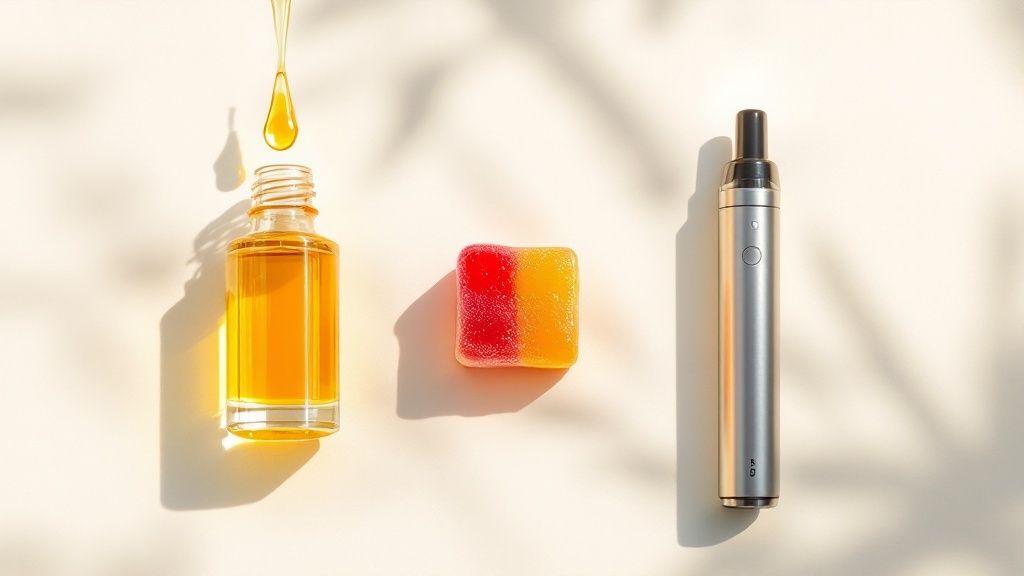
Common consumption methods include:
-
Inhalation (Vaping): Offers high bioavailability (10-60%) and rapid onset (minutes), but the effects are shorter-lived (2-3 hours). Learn more about Consumption Methods and Bioavailability for vaping CBD. However, be aware of potential respiratory risks.
-
Oral Ingestion (Edibles, Capsules): Lower bioavailability (4-20%) and slower onset (1-2 hours), but effects last longer (6-8+ hours). Dosage can be challenging, particularly with homemade edibles, but fatty foods can help to increase bioavailability due to the fat-soluble nature of cannabinoids.
-
Sublingual Administration (Tinctures): Placing CBD oil under the tongue allows for faster absorption into the bloodstream, bypassing the digestive system, with a quicker onset than edibles. SMOKO offers a range of broad-spectrum CBD tinctures which contain a variety of cannabinoids and terpenes, offering potential entourage effects.
-
Topical Application (Creams, Balms): Provides localised relief for muscle soreness and skin conditions without systemic absorption.
Pros of Varied Consumption Methods:
-
Personalisation based on individual needs and preferences.
-
Control over onset time and duration of effects.
-
Options that avoid respiratory risks.
-
Targeted relief with topical application.
Cons of Varied Consumption Methods:
-
Inconsistent absorption between individuals and methods.
-
Difficulty with precise dosing.
-
Potential health risks associated with some methods (e.g., vaping).
-
Variable effects due to individual metabolism and body composition.
Tips for CBD Consumption:
-
Start low and go slow, especially with edibles. Wait at least 2 hours before taking more.
-
Take oral CBD products with fatty foods to improve absorption.
-
Keep a consumption journal to track different methods and their effects.
Examples:
- SMOKO CBD tinctures provide a convenient and precise method for dosing.
Choosing the right CBD product and consumption method is essential for a positive experience. Third-party lab testing is critical for ensuring product quality, purity, and accurate labelling. Always consult with a doctor before using CBD, especially if you are pregnant, breastfeeding, or taking other medications. This is particularly important for individuals with pre-existing health conditions. This section's focus on consumption methods and bioavailability directly addresses the need for informed decision-making regarding CBD use, ultimately empowering users in the UK to navigate the diverse landscape of CBD products effectively.
7. Drug Testing and Detection
Drug testing and detection is a critical consideration for anyone using CBD products, especially in the UK where workplace drug testing is becoming increasingly common. This section explores the complexities of cannabis testing, focusing on the differences between CBD and THC, and how these differences can impact test results. This information is particularly relevant for those subject to regular drug screenings, ensuring informed decisions and minimising potential risks.
Drug tests typically screen for THC-COOH, a metabolite of THC, not CBD itself. However, the presence of even trace amounts of THC in full-spectrum CBD products can trigger a positive result. Studies have shown that even legally compliant CBD products can lead to detectable levels of THC in urine and variation in labelling accuracy exists. This makes it crucial to choose your CBD products carefully. Independent third-party lab test certificates are essential for verifying the THC content and overall quality of a CBD product. These certificates provide an unbiased analysis of the product's composition, ensuring transparency and consumer safety.
SMOKO CBD Broad-Spectrum Products:
SMOKO offers a range of broad-spectrum CBD products, which are ideal for those concerned about drug testing. Their product line includes:
-
Oral drops or 'tinctures' in three flavours (Mint, Mixed Berry and Citrus) at three different strengths: 500mg, 1000mg and 2000mg (total per bottle) .
-
CBD soft-gel capsules containing 25mg of broad-spectrum CBD per capsule.
-
CBD gummies that also contain 25m of broad-spectrum CBD that are gluten free and vegan friendly!
For those new to CBD, starting with a low dose, such as 10mg per day, is recommended. You can gradually increase the dosage as needed.
Tips for Navigating Drug Testing While Using CBD:
-
Choose CBD isolate or broad-spectrum products: These eliminate the risk of THC ingestion.
-
Request Certificates of Analysis (COAs): Verify the THC content of any CBD product before purchase.
-
Be mindful of consumption levels: Even trace amounts of THC can accumulate with regular use.
Important Considerations:
Individuals taking prescribed medications, pregnant or breastfeeding women, and those with underlying health conditions should consult a doctor before using CBD products. This is crucial to ensure safety and avoid potential interactions with medications.
This information is intended for educational purposes only and should not be interpreted as medical advice. Always consult with a healthcare professional before making decisions about your health or treatment.
CBD vs THC: Key Differences Overview
|
Factor / Aspect |
Chemical Structure and Composition 🔄 |
Psychoactive Effects ⭐⚡📊 |
Medical Applications and Therapeutic Uses ⭐📊💡 |
Legal Status and Regulations 🔄📊💡 |
Side Effects and Safety Profiles ⚡⭐ |
Consumption Methods and Bioavailability ⚡💡 |
Drug Testing and Detection 📊💡 |
|---|---|---|---|---|---|---|---|
|
Implementation Complexity |
Medium complexity in chemistry |
Moderate: understanding receptor interaction |
High complexity in clinical applications |
High complexity: evolving laws and compliance |
Moderate complexity: managing side effect risks |
Variable complexity depending on method |
Moderate complexity: testing and interpretation |
|
Resource Requirements |
Lab equipment for molecular analysis |
Clinical studies and symptom monitoring |
Medical research, clinical trials, healthcare providers |
Legal expertise, regulatory agencies, testing labs |
Clinical and toxicological resources |
Devices for inhalation, ingestion, topical application |
Drug test kits, lab analysis |
|
Expected Outcomes |
Clear differentiation of compounds |
Psychoactive vs non-intoxicating effects |
Targeted treatment of specific conditions |
Varied legality; affects access and availability |
Risk profiles; safety in use and dosage |
Optimized onset, duration, and bioavailability |
Reliable THC detection; potential false positives |
|
Ideal Use Cases |
Pharmaceutical R&D, scientific study |
Recreational use, mental health therapy |
Medical treatment of epilepsy, pain, inflammation |
Legal compliance, product distribution |
User safety, side effect management |
Personalized consumption method selection |
Employment drug screening, legal compliance |
|
Key Advantages |
Explains why effects differ; guides drug design |
THC's therapeutic psychoactivity; CBD's non-impairment |
FDA approvals for specific cannabinoids; entourage effect |
Legal hemp-CBD access; innovation in product markets |
Low dependence potential; CBD mitigates THC side effects |
Multiple choices for dose/timing; reduced respiratory risk |
Clear guidance for users on product choice |
|
Key Disadvantages |
Complex chemistry; ongoing research gaps |
THC may cause anxiety/paranoia; legal limits |
Regulatory barriers; variable product quality |
Conflicting laws cause user confusion |
THC can impair cognition; interactions with drugs |
Difficult precise dosing; some methods have health risks |
Risk of false positives; legal consequences |
Embarking on Your CBD Journey with SMOKO
Understanding the difference between CBD and THC is crucial for anyone interested in exploring the potential benefits of cannabinoids. This article has covered key distinctions between these two compounds, from their chemical structures and interaction with the endocannabinoid system (the body's complex cell-signaling system) to their legal status and potential effects. We've explored how THC, the psychoactive component in 'cannabis' plants, interacts with the endocannabinoid system, leading to altered perceptions. Conversely, CBD, predominantly derived from 'hemp' plants (a variety of Cannabis sativa containing less than 0.2% THC), offers potential therapeutic benefits without the psychoactive effects of THC, making it a popular choice for those seeking natural wellness solutions. We also delved into the importance of independent third-party lab testing, highlighting studies demonstrating the inconsistency of labelling accuracy and the importance of verifiable results. This rigorous testing ensures the purity and safety of CBD products, confirming the absence of THC and verifying cannabinoid content. Finally, we discussed the various types of CBD extracts – isolate, broad-spectrum, and full-spectrum – empowering you to choose the best option based on your individual needs and preferences.
Mastering the nuances of CBD vs. THC empowers you to make informed decisions about your wellness journey. Whether you're seeking relief from anxiety, pain management, or simply exploring natural health alternatives, understanding these concepts can lead to more effective and personalized outcomes. By choosing CBD, you're selecting a path towards natural wellness without the psychoactive effects of THC.
Ready to experience the potential benefits of CBD? Explore SMOKO's premium broad-spectrum products – tinctures and edibles – all rigorously tested to ensure no THC content. SMOKO CBD provides the wellness benefits of CBD without the psychoactive effects of THC, offering a trusted and reliable option for UK consumers. Visit SMOKO CBD today to discover the perfect product for your needs and start your journey toward a healthier, more balanced you.
